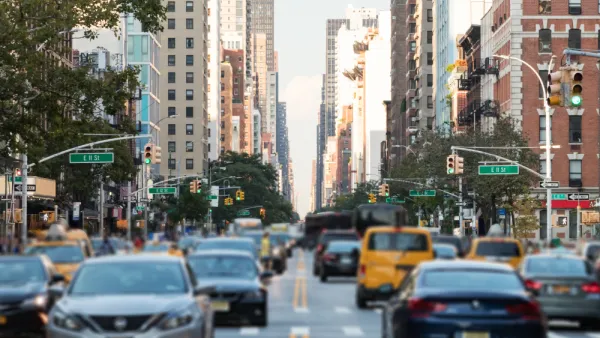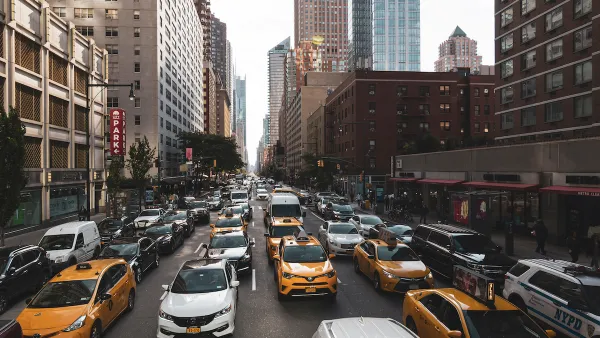New York's long-awaited congestion pricing program could break open the controversial practice in the United States.

New York City’s congestion pricing program, set to launch next year, could pave the way for similar programs in other U.S. cities, which have been reluctant to implement cordon pricing despite its popularity in other parts of the world, writes Adie Tomer in Bloomberg CityLab.
“Congestion pricing isn’t just a new fee on driving; it’s the single most powerful transportation experiment America has not yet tried,” Tomer claims. This demand-driven approach to traffic management can reduce congestion, boost public transit use, and raise revenue. In New York, “the state plans to reinvest nearly 100% of the congestion revenues back into the MTA system, shoring up annual budgets today and unlocking expansion plans in the future.”
Tomer believes that once the benefits of the program become evident, more cities will quickly follow suit. “Once congestion pricing gets off the ground, it can unlock the Holy Grail of transportation pricing: vehicle miles traveled (VMT) fees, which would charge for every mile driven, not just those in specific zones.”
FULL STORY: NYC Congestion Pricing Could Unleash a Transportation Revolution

National Parks Layoffs Will Cause Communities to Lose Billions
Thousands of essential park workers were laid off this week, just before the busy spring break season.

Retro-silient?: America’s First “Eco-burb,” The Woodlands Turns 50
A master-planned community north of Houston offers lessons on green infrastructure and resilient design, but falls short of its founder’s lofty affordability and walkability goals.

Delivering for America Plan Will Downgrade Mail Service in at Least 49.5 Percent of Zip Codes
Republican and Democrat lawmakers criticize the plan for its disproportionate negative impact on rural communities.

Test News Post 1
This is a summary

Test News Headline 46
Test for the image on the front page.

Balancing Bombs and Butterflies: How the National Guard Protects a Rare Species
The National Guard at Fort Indiantown Gap uses GIS technology and land management strategies to balance military training with conservation efforts, ensuring the survival of the rare eastern regal fritillary butterfly.
Urban Design for Planners 1: Software Tools
This six-course series explores essential urban design concepts using open source software and equips planners with the tools they need to participate fully in the urban design process.
Planning for Universal Design
Learn the tools for implementing Universal Design in planning regulations.
EMC Planning Group, Inc.
Planetizen
Planetizen
Mpact (formerly Rail~Volution)
Great Falls Development Authority, Inc.
HUDs Office of Policy Development and Research
NYU Wagner Graduate School of Public Service





























